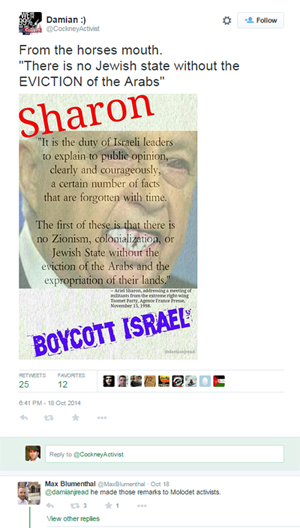
A false quote on Twitter supported by Max Blumenthal. Click on the image above for more information.
In the world of anti-Israel activism, fabricated Zionist quotes are a thing. They thrive and multiply in the crazier corners of the Internet. They occasionally find their way into mainstream newspapers, only to be later corrected. And one such misquote was even sent to Hillary Clinton by one of her closest confidants, a recent dump of the former Secretary of State’s emails reveals.
The Blumenthals
That confidant, Sidney Blumenthal, is a controversial figure in Washington. He has been nicknamed “Insidious Sid” and “Grassy Knoll,” the latter a reference to what is seen as his penchant for conspiracy theories. But Sidney is tame compared to his son, the anti-Israel extremist Max Blumenthal.
The younger Blumenthal’s radical, hateful politics makes him somewhat of an outcast, even if his antics occasionally garner unflattering attention, as when Germany’s largest newspaper dubbed him a “lunatic” and a politician from that country’s Left Party described him as an “anti-Semitic journalist.” Through his father, though, he has some access to the mainstream political elite — Max is the occasional subject of Sidney’s frequent notes to Clinton, for example — which is especially troubling in light of the vitriol and factual errors that so often appear in Max’s writings.
Indeed, in an Aug. 1, 2010, email released by the State Department this week Sidney sent to the Secretary of State the text of one of his son’s polemics, and in doing so exposed the future presidential candidate to one of those false Zionist quotes that are so popular with haters of the Jewish state.
The quote in Max Blumenthal’s article, purportedly by Zionist founding father Chaim Weizmann, quickly raised suspicions. “I wonder if the Weizmann quote is authentic,” an astute observer on Twitter wrote.
.@RosieGray This is the @MaxBlumenthal blog post Sid forwarded to Hillary http://t.co/BY5S6lo2Dm I wonder if the Weizmann quote is authentic
— Nurit Baytch (@NuritBaytch) September 1, 2015
The suspicion was well-deserved. Max Blumenthal has demonstrated a willingness to spread fabricated, distorted, and disavowed quotes. An article by him published on the New York Times website had to be repeatedly corrected by editors. His “venomous distortions” and authorship of what one left-wing columnist has dubbed “The ‘I Hate Israel’ Handbook” have even earned him the endorsement of former Ku Klux Klan leader David Duke.
And here he was, in an email to Hillary Clinton, quoting Weizmann as follows:
As for the present condition of Israeli democracy, it is essential to consider the way in which the state pits its own citizens against one another, enlisting the Jewish majority as conquerers [sic] while targeting the Arab others as, in the words of Zionist founding father Chaim Weizmann, “obstacles that had to be cleared on a difficult path.”
But these are not the words of Chaim Weizmann.
The Quote
The trail to the source is a bit long. Blumenthal substantiates his quote with a link to an article on the anti-Israel website Palestine Remembered, hardly a reliable source for a serious journalist. Palestine Remembered, in turn, points to Nur Masalha’s book Expulsion of the Palestinians. Masalha’s endnote attributes the quote to Simha Flapan’s Zionism and the Palestinians, “citing a letter dated 19 August 1918.”
Flapan, one of Israel’s controversial “new historians,” indeed includes those words in his book. But they are clearly a paraphrase by the revisionist historian, not a quote of the Zionist leader. “In a letter to his son, Weizmann compared the Arabs of Palestine to the rocks of Judea, as obstacles that had to be cleared on a difficult path,” Flapan argues.
Flapan’s quote, which Blumenthal dishonestly passed off as a Weizmann quote, actually misrepresents the letter. It was written to Weizmann’s wife, not his son, though that is the least of the problem. The missive begins by empathizing with his wife Vera, who was upset that a Jewish colleague, Leon Simon, had neglected to meet with her. “If we fail in our work,” Weizmann tells his wife, “it won’t be because of the British or the Arabs, but solely because of the Jews.” After tending to a few logistical concerns, Weizmann
again turns to comforting his wife, and in this context we see the actual reference to “Arabs” and “rocks”:
again turns to comforting his wife, and in this context we see the actual reference to “Arabs” and “rocks”:
I feel from the tone of your letter that you are depressed and lonely. This all makes my heart ache, but I’m coming to you soon and we shall be happy and contented together, my Verochka! But what people are like and especially Jews! I’ve seen little of that here! But they are our people, there are no others. That is small comfort, but what can one do? One must come to terms with it, just as with the climate of Palestine, the rocks of the Judean hills, the Arabs and other difficult obstacles in our difficult path.
It is obvious from Weizmann’s words that he did not not view Arabs as obstacles to be removed like rocks, any more than he described Jews as such, or any more than he argued a need to “clear” the area of its hot climate. To the contrary, his letter says one must “come to terms with” these things (meaning, as one definition in the The American Heritage Dictionary of Idioms notes, to “reconcile oneself to” them).
The Jews, Arabs, rocks and climate, he believed, posed certain challenges in the fight for a Jewish home, which he said in the letter had made him “noticeably more grey” in the five months he had spent in the region.
The Context
The issue with rocks and the hot climate might be self-explanatory. About Arabs, his letters at the time betrayed no particular bigotry, but rather concern about Arab-Jewish relations and the competing nationalisms emerging in the area. “There is hardly any chance of our ever finding a common language with the local element,” he wrote to an interlocutor a few days before sending the letter to his wife, “but on the other hand I have serious hopes and plans as far as our relatives across the Jordan,” a reference to Transjordan’s Arabs led by the pan-Arab nationalist Emir Faisal.
Indeed, Weizmann expressed strong sympathy with pan-Arab nationalism. With the success of the movement, Weizmann told a senior British official, “I foresee … a possibility for a sincere cooperation between the two Nations,” the Arabs and the Jews. Faisal reciprocated: We the Arabs “look with the deepest sympathy on the Zionist movement,” he stated, and “will wish the Jews a most hearty welcome home.”
Some days earlier, Weizmann sent the British official reassurances that he has no interest in clearing the area of its local Arabs. “What I said in my speech at Jerusalem about our intentions toward the Arabs was sincerely meant. We have no desire and no need to exploit or displace them.”
But there were indeed challenges. “The present Jewish population is much too weak and cannot cope with the actual organized and systematical opposition of the Arabs,” Weizmann told a colleague that spring. In another letter he cited, as an example of this opposition, speeches by local Arabs which “took it for granted that Palestine was and must remain a purely Arab country.” The speeches “indicated not merely a complete misconception of Jewish aims, which might be removed by explanation, but also definite hostility to any sort of association between Palestine and Jewish national aspirations.”
So yes, Weizmann saw challenges related to the Arab population. And as his letter made clear, he saw challenges related to the Jewish population, too. In fact, his contemporaneous language about Jews, especially those in Jerusalem, appears more strident than any language about the Arabs. “The Jewish quarters in Jerusalem are nothing but filth and infection,” he stated in a letter to his wife, citing “the indescribable poverty, stubborn ignorance and fanaticism.” Elsewhere he referred to a substantial number of Jerusalem Jews as behaving like “parasites.” (See The Letters and Papers of Chaim Weizmann, Series A, Volume 8.)
The Conclusion
Max Blumenthal, then, misquoted Chaim Weizmann. That’s hardly surprising, considering his penchant for hoax quotes and distortions. Blumenthal, like the anti-Semites running David Duke’s website, Jew Watch, Rense.com, and Iran’s Press TV, see to it that such falsified quotes spread.
And spread they do. The author of a 2002 Chicago Reader piece, about another hoax quote corrected by CAMERA, explained that a “Google search of ‘Jewish people control America’ brought up nearly 190 links, and despite that editor’s note from Universal Press, they were far from all belonging to the Palestinian press.” Today, a search on the same hoax quote results in about 14,000 hits.
But those links, thanks in large part to CAMERA’s debunking, point mostly to fringe hate sites, comment sections, and rebuttals — precisely where the falsehoods and propaganda belong.
It is much more alarming, though, that Max Blumanthal’s extremism and misinformation appeared, thanks to his well-connected father, in Hillary Clinton’s inbox.

